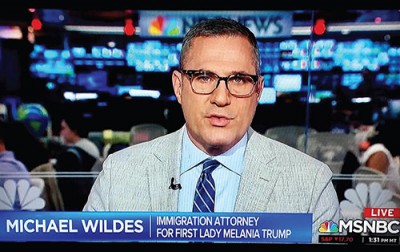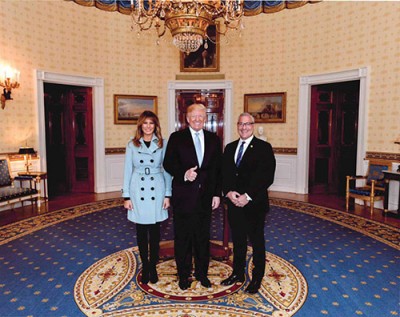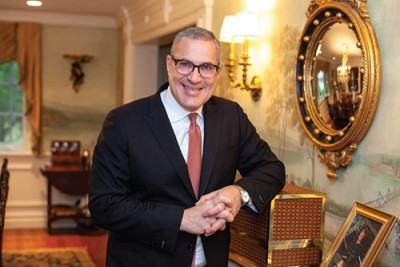



Immigration, both legal and illegal, has become the hot topic all around the country. Every candidate for the next presidential election and even local election will be scrutinized by their stance on this subject. So many news stories and flashpoints are filled with acerbic remarks about enablers and oppressors; it is easy to become disenfranchised with the whole idea. Yet amongst the sea of dialogue, it seems that the voice of reason may very well be on the outside. For those looking for a non-romanticized solution to a difficult problem, it may be worth asking questions elsewhere. Attorney Michael Wildes recently published his first book, Safe Haven in America: Battles to Open the Golden Door, chronicling his career as a leading immigration attorney who has represented numerous celebrities and prominent political and governmental figures. He was also recently elected the mayor of Englewood, New Jersey. I am therefore proud to present the following interview stylistically based of our conversation.
BJL: Please tell our readers a little about yourself. How did you decide to pursue a career in Immigration?
Well, you can say it has a lot to do with DNA. My father began his own practice way back in the 60s, before I was even born. I had the great opportunity to see my father interact with a variety of clientele and guide them through a broad spectrum of legal issues. My legal experience therefore began way before my legal schooling, and my Bar exam was more of a marker along the path rather than the beginning of a new career. Unlike what you may expect based on today’s rhetoric, immigration always was a relevant topic. Growing up I was fascinated by how this legal niche influenced all avenues of American culture.
The truth is that it has a lot to do with my relationship with my father. I remember as a young child going into Manhattan on a Sunday just to cut scrap paper with my dad; I looked to him as a role model at a young age. I think that regardless of what he would choose as a profession, I would have always been at his side.
Back in 1960, starting a business was hard and I never take for granted that extraordinary opportunity and legacy my father gave me. Even so, in many ways we are all on the same basis, like new immigrants in this regard. Because whether you walk into a business or apply for a job it is important to understand that there is no “entitlement” when it comes to ethical behavior. You must draw the right conclusions and guide yourself morally and properly no matter what business or profession you pursue. As we chase our careers, we must remember that our true character will be revealed not only by the kind of job we seek but the way in which we actualize our dreams.
BJL: Can you tell us a little about your current work?
Let’s sum it up this way: I spend my week speaking to hundreds of people seeking a better life on US soil.
Collectively, the diverse groups of visa petitioners and beneficiaries we represent have all left their own unique imprint on the fabric of our nation’s society. In particular, my dad’s work with (Beatles front man) John Lennon, probably one of the most famous and influential free thinkers of his time, had a profound effect on my perception of our profession. Since then, I have embarked on careers in the legal and political realms that have been dedicated to the advocacy of diversity, equality and social justice. In all, I have had a chance to help deport some bad guys, help some good guys stay here and evaluate from the urban, suburban and city perspectives the experiences that immigrants undergo upon their arrival to the U.S.
However I don’t define my work strictly by my legal career. I had the privilege of serving as an Auxiliary Police Office with the NYPD; a Federal Prosecutor with the US Attorney’s Office; and Mayor of the City of Englewood where I reside with my beautiful family. But this remains incomplete without my faith, and so I am also actively involved in the Hatzoloh Ambulance Service and Chevra Kadisha in my community.
BJL: The politics of Immigration, both Legal and Illegal, have moved to the forefront of national debate. Do you have any comment on this?
Rather than opine, let’s talk facts. In a nation built by immigrants—legal or otherwise—studies reveal the role of the immigrant entrepreneur is on the rise. Studies have shown that immigrants’ share of small business ownership in the U.S. has risen to 18 percent from 12 percent two decades ago. That translates into the more important fact that more than one in six small businesses is owned by immigrants, even as they make up just 13 percent of the overall population.
These stats do not mean that incoming foreigners are smarter than Americans, but, they do come here more likely to be risk-takers as they pull up roots from their own country and look for a fresh start.
With immigrant business ownership come jobs and income. An estimated 4.7 million U.S. workers are employed by immigrant-owned firms gathering some $776 billion in revenues.
The largest group of immigrant business owners are in the professions and business service sector (141,000), retail and construction (120,000 owners for each) followed by educational and social services and leisure/hospitality sectors (each with 100,000). Numbers like these show demonstrate that the political discourse needs to become more civilized, so that we continue to see growth as a country.
On March 3rd, Attorney Michael Wildes, in collaboration with the Alliance of Bukharian Americans and the Chazaq Organization, will host a presentation followed by a Question and Answer session at Beth Gavriel Bukharian Congregation (6635 108th St. Forest Hills, N.Y. 11375 - 1st Floor). Please join us and spread the word!
Interviewing Michael Wildes: Immigration From An Attorney’s Perspective
Typography
- Smaller Small Medium Big Bigger
- Default Helvetica Segoe Georgia Times
- Reading Mode




